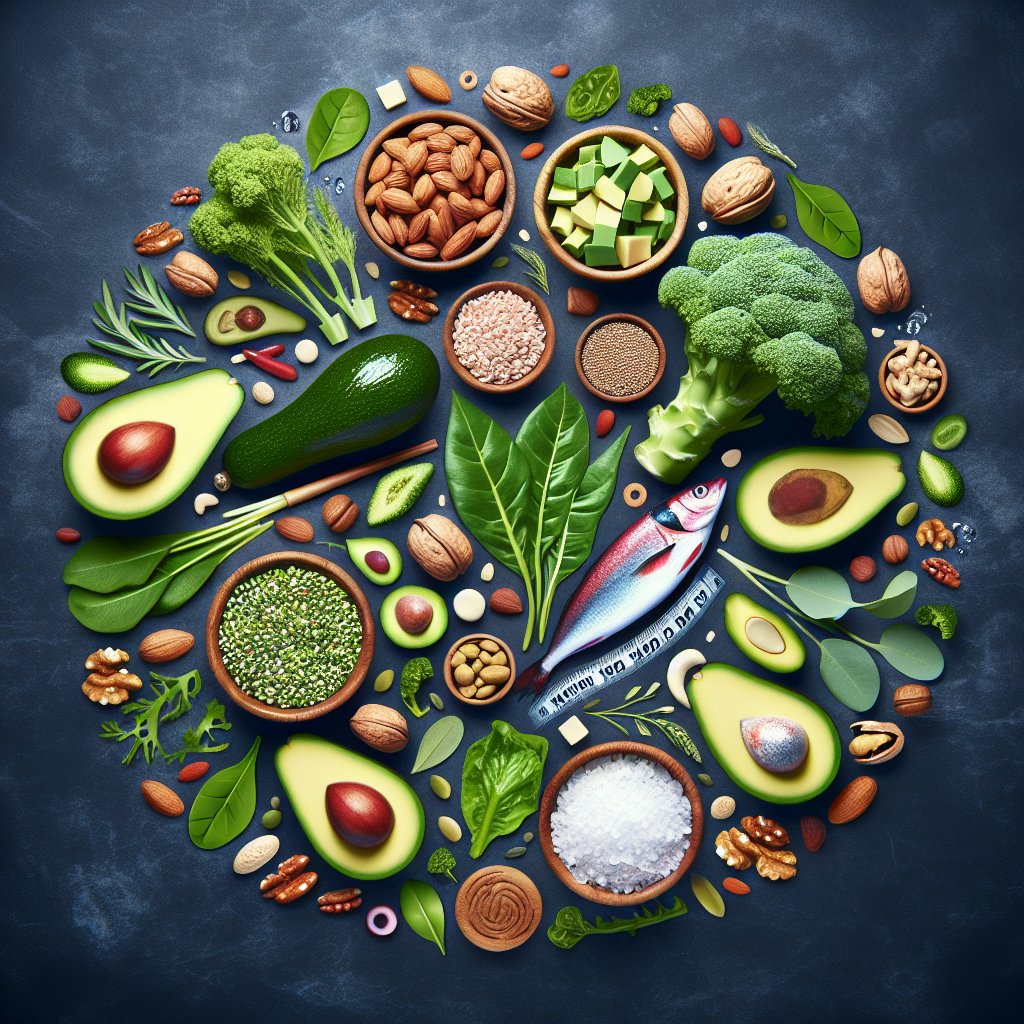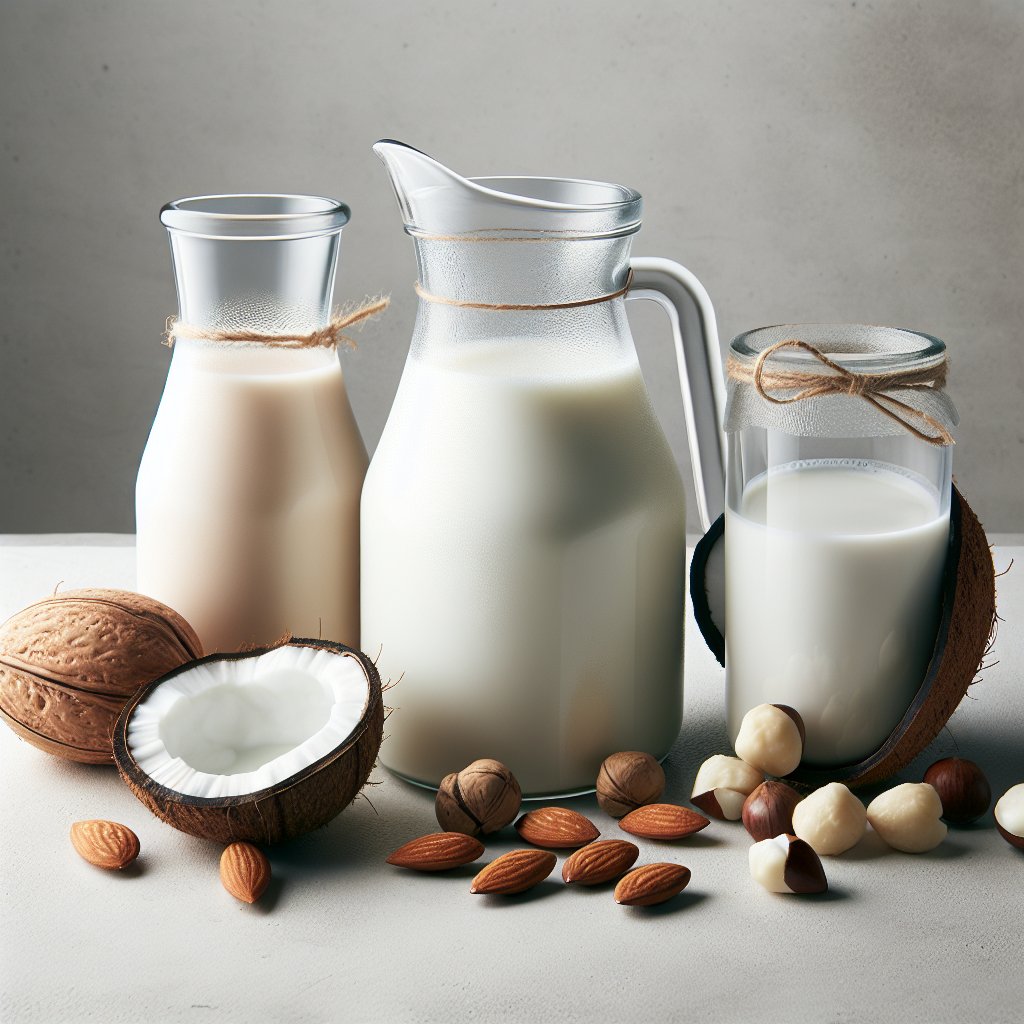Discover the Best Keto-Friendly Milk Options: Your Essential Guide to Choosing What Milk is Keto for Your Diet!
Brief Overview of the Ketogenic Diet and Its Principles
So you’ve heard a lot about the ketogenic diet, also known as the keto diet, but what exactly is it? Let’s break it down in simple terms.
The ketogenic diet is a low-carb, high-fat diet that offers various health benefits. The primary goal of this diet is to induce a metabolic state called ketosis. When following the keto diet, your body shifts from using glucose as its primary source of energy to using ketones, which are produced from the breakdown of fats in the liver. This transition in fuel source can have a profound impact on weight loss, blood sugar control, and overall health.
The diet typically consists of high-fat, moderate-protein, and very low-carbohydrate foods. By significantly reducing your carbohydrate intake and replacing it with healthy fats, your body becomes incredibly efficient at burning fat for energy. Not only does this lead to weight loss, but it also helps stabilize blood sugar levels and can even improve mental clarity and focus.
Some popular foods in a ketogenic diet include avocados, meat, fatty fish, cheese, nuts and seeds, low-carb vegetables, and healthy oils like olive oil and coconut oil.
Research supports the effectiveness of the ketogenic diet for weight loss and improving certain health conditions. A study published in the Journal of Clinical Endocrinology & Metabolism found that individuals following a ketogenic diet lost more weight compared to those on a low-fat diet over a 12-month period.
Ultimately, the ketogenic diet focuses on shifting your body’s energy metabolism towards a state that can offer numerous health benefits. As we venture further into this article, we’ll explore how milk can fit into this dietary lifestyle and which choice is the best for those following a ketogenic diet. But first, let’s delve into the world of keto-friendly milk options.

Benefits of Consuming Keto-Friendly Foods
Following a keto diet can offer a multitude of advantages that extend beyond weight loss. The ketogenic diet, which is high in healthy fats, adequate in protein, and low in carbohydrates, has been linked to various health benefits according to scientific research.
1. Weight Loss and Improved Body Composition
One of the most well-known benefits of the keto diet is its effectiveness in promoting weight loss and improving body composition. Research published in the Journal of Clinical Endocrinology and Metabolism found that individuals following a ketogenic diet experienced greater weight loss compared to those on a low-fat diet.
2. Enhanced Mental Focus and Clarity
Consuming keto-friendly foods can lead to improved cognitive function and mental clarity. A study in Neurobiology of Aging suggests that a ketogenic diet may improve cognitive function and reduce symptoms of mild cognitive impairment.
3. Regulated Blood Sugar Levels
For those with diabetes or prediabetes, a keto diet can be especially beneficial. The American Journal of Clinical Nutrition reported that the ketogenic diet improved insulin sensitivity and glycemic control in patients with type 2 diabetes.
4. Increased Energy Levels
Many individuals report experiencing a boost in energy levels when they switch to a keto diet. Research in the Journal of Sports Science & Medicine suggests that a ketogenic diet can enhance endurance performance by utilizing fat as a more efficient energy source.
By incorporating keto-friendly milk options into your diet, you can reap these benefits while still enjoying dairy in a way that aligns with your nutritional goals.
Now, let’s dive into the specific keto-friendly milk options that you can incorporate into your ketogenic lifestyle.
Understanding the Role of Milk in a Keto Diet
So, you’ve decided to embark on the wonderful journey of the ketogenic diet. You’re ditching the carbs and embracing healthy fats as your primary energy source. However, amidst all the excitement, you might be wondering where milk fits into this equation. Is it keto-friendly? Let’s dive into the science and find out.
Is Milk Keto-Friendly?
First things first, the keto diet is all about keeping your carbohydrate intake low while consuming moderate protein and higher amounts of healthy fats. When it comes to milk, the traditional cow’s milk does contain lactose, a type of sugar. An 8-ounce cup of cow’s milk typically has around 12 grams of net carbs, which could quickly eat into your daily carb allowance on a keto diet.
However, there are keto-friendly milk alternatives that fit perfectly into this low-carb lifestyle. These options provide essential nutrients without the excessive carbs found in regular milk.
Keto-Friendly Milk Options
1. Unsweetened Almond Milk:
Almond milk is naturally low in carbs, with only 1-2 grams of net carbs per serving. It’s also rich in vitamin E and can be used in both sweet and savory keto recipes.
2. Unsweetened Coconut Milk:
Coconut milk contains minimal carbs, with around 1 gram of net carbs per cup. It’s creamy, flavorful, and adds a delicious tropical touch to your keto dishes.
3. Unsweetened Cashew Milk:
Cashew milk is another excellent option for keto dieters, containing approximately 1-2 grams of net carbs per cup. It’s smooth, nutty, and a great addition to your morning coffee or keto smoothies.
4. Unsweetened Flax Milk:
Flax milk is extremely low in carbs, with less than 1 gram of net carbs per cup. It’s also high in omega-3 fatty acids, making it a fantastic choice for your keto lifestyle.
Incorporating Milk into Your Keto Lifestyle
Now that we’ve explored the keto-friendly milk options, let’s discuss how to incorporate them into your daily life. These milk alternatives can be used in various ways on a keto diet:
-
Coffee and Tea: Substitute traditional milk with unsweetened almond or coconut milk in your morning brew.
-
Smoothies: Create delicious keto smoothies using almond, cashew, or flax milk as the base for a creamy and satisfying treat.
-
Cooking and Baking: Use these milk alternatives in your keto-friendly recipes to add moisture and richness without the added carbs.
By embracing these keto-friendly milk options, you can continue to enjoy dairy-like beverages and dishes without compromising your low-carb lifestyle. So, go ahead and explore the wonderful world of keto-friendly milks – your taste buds and your health will thank you!

Detailing the Nutritional Content of Different Types of Milk
When it comes to the ketogenic diet, finding the right milk that aligns with your dietary goals is important. Let’s take a closer look at the nutritional content of different types of milk to help you make an informed decision.
Whole Milk
Whole milk is known for its rich and creamy texture. However, it’s important to note that it contains around 12 grams of net carbs per 8-ounce serving, making it higher in carbohydrates and not the best option for the keto diet.
Almond Milk
Almond milk has gained popularity among those following a keto lifestyle. It is low in carbs, with around 1-2 grams of net carbs per 8-ounce serving. Additionally, it is often fortified with vitamins and minerals, making it a nutritious choice for keto enthusiasts.
Coconut Milk
Coconut milk is another keto-friendly option. It contains approximately 1-2 grams of net carbs per 8-ounce serving. It’s high in healthy fats, which can be beneficial for individuals on the keto diet as it helps to keep them satiated.
Unsweetened Cashew Milk
Unsweetened cashew milk is low in carbs, with around 1-2 grams of net carbs per 8-ounce serving. It’s also a good source of healthy fats and provides a creamy texture, making it a versatile ingredient for keto cooking and baking.
Summary
When considering what milk is keto, almond milk, coconut milk, and unsweetened cashew milk are excellent choices due to their low carbohydrate content and high fat content. These options can be seamlessly incorporated into your keto meal plans, whether in your morning coffee, smoothies, or as a base for keto-friendly recipes.
Now that you have a clear understanding of the nutritional content of different types of milk, you can confidently select the best keto-friendly milk that suits your dietary preferences and support your keto journey.
Types of Milk Compatible with the Keto Diet
When it comes to the keto diet, making the right choices about what to eat and drink is crucial. While milk is typically considered a high-carb beverage, there are several keto-friendly milk options available that can be incorporated into your low-carb lifestyle. Let’s explore some of these alternatives and find out what milk is keto.
1. Unsweetened Almond Milk
Almond milk is a popular choice for those following a keto diet. It is low in carbs, with only 1-2 grams of net carbs per serving, making it an excellent milk substitute. Additionally, almond milk is rich in vitamin E and is often fortified with essential nutrients like calcium and vitamin D.
2. Coconut Milk
Coconut milk is another great option for individuals on a keto diet. It contains lauric acid, a type of healthy fat that can support heart health. When selecting coconut milk, opt for the unsweetened varieties to avoid added sugars and unnecessary carbs.
3. Hemp Milk
Hemp milk is derived from the seeds of the hemp plant and is an excellent source of omega-3 fatty acids. It is also low in carbohydrates, making it a suitable choice for those following a ketogenic lifestyle. Additionally, hemp milk contains all nine essential amino acids, making it a complete protein source.
4. Macadamia Nut Milk
Macadamia nut milk is a creamy and delicious option for individuals seeking a keto-friendly milk alternative. It is low in carbs and high in monounsaturated fats, which can promote a feeling of fullness and aid in weight management. Look for unsweetened macadamia nut milk to keep your carb intake to a minimum.
5. Flax Milk
Flax milk is made from flaxseeds and offers a nutty flavor profile. It is a good source of plant-based omega-3 fatty acids and is free from cholesterol, lactose, and soy. With just 1-2 grams of net carbs per serving, flax milk is a suitable choice for those following a ketogenic diet.
When choosing keto-friendly milk options, it’s essential to read the labels carefully to ensure that the products do not contain added sugars or high carbohydrate content. Incorporating these low-carb milk alternatives into your diet can help you stay on track with your keto lifestyle while still enjoying the creamy goodness of milk.
Experiment with different keto-friendly milk options to find the ones that best suit your taste preferences and dietary needs. Whether you prefer the nuttiness of almond milk, the creaminess of coconut milk, or the richness of macadamia nut milk, there’s a keto-friendly milk out there to complement your low-carb journey!

Effects of Milk on Ketosis
One of the primary concerns for individuals on the ketogenic diet is the impact of milk consumption on ketosis levels. Let’s explore the relationship between milk and ketosis to understand what milk is keto-friendly and how it affects your diet.
When it comes to ketosis, the goal is to keep your body in a state where it burns fat for fuel instead of glucose. Since milk contains lactose, a type of sugar, there has been concern about its potential to kick you out of ketosis. However, several studies have shed light on the effects of milk on ketosis.
Milk and Insulin Response
A study published in the American Journal of Clinical Nutrition found that the insulin response to milk can vary depending on its fat content. Whole milk showed a greater insulin response compared to skim milk. However, neither of them significantly impacted blood glucose levels when consumed in moderation.
This suggests that moderate consumption of milk, especially lower fat options, is unlikely to have a substantial effect on ketosis for most individuals. It’s important to be mindful of portion sizes to ensure that you stay within your daily carb limit while enjoying milk on a keto diet.
Impact of Milk Proteins
Another aspect to consider is the protein content of milk. Whey and casein, the two primary proteins in milk, have been found to have minimal effects on blood sugar levels and insulin secretion in healthy individuals, according to a study in the British Journal of Nutrition.
This suggests that the protein in milk is not likely to hinder your ketosis efforts. In fact, the protein in milk can be beneficial for muscle maintenance and overall satiety, which are important factors to consider in a well-rounded ketogenic diet.
Choosing Keto-Friendly Milk Options
So, what milk is keto? When selecting milk for a ketogenic diet, it’s essential to prioritize options that are low in carbohydrates. Unsweetened almond milk, coconut milk, and macadamia milk are popular choices for individuals following a keto lifestyle. These milk alternatives typically contain minimal carbs, making them suitable for maintaining ketosis.
It’s important to read the nutrition labels carefully and opt for unsweetened varieties to avoid added sugars. Additionally, some dairy-based options like heavy cream and certain types of cheese can also be included in a keto diet due to their low carbohydrate content.
In conclusion, while milk consumption should be moderated on a ketogenic diet, choosing keto-friendly milk options can still allow you to enjoy dairy while staying in ketosis. Paying attention to the macronutrient content and being mindful of portion sizes will empower you to make informed choices about including milk in your keto lifestyle.
Recommended Milk Alternatives for Keto Diet
When following a keto diet, it’s important to find suitable milk alternatives that align with the low-carb, high-fat requirements of this lifestyle. While traditional cow’s milk contains lactose, a form of sugar, many individuals on a keto diet seek alternative milk options. The good news is that there are plenty of keto-friendly milk alternatives available to enjoy in your daily routine.
Unsweetened Almond Milk
One popular and widely available option is unsweetened almond milk. Not only is it low in carbs, but it’s also rich in vitamins and minerals, such as vitamin E and calcium, making it a great choice for those on a keto diet. It’s ideal for use in smoothies, coffee, or for adding creaminess to keto-friendly recipes.
Coconut Milk
Another excellent milk alternative for keto is coconut milk. It contains healthy fats, particularly medium-chain triglycerides (MCTs), which are known for their potential to promote ketone production in the body. Look for unsweetened varieties to keep the carb count low, and use it in both sweet and savory keto dishes for a rich, tropical flavor.
Macadamia Milk
If you’re looking for a luxurious, creamy option, consider macadamia milk. With its indulgent texture and minimal carbs, it’s a great addition to your keto pantry. Plus, it’s high in monounsaturated fats, which can support heart health and satiety, making it an all-around great choice for a keto diet.
Remember to always opt for unsweetened versions of these milk alternatives to ensure you’re not consuming added sugars or unnecessary carbs. It’s also essential to check the nutrition labels and opt for those without carrageenan or other stabilizers commonly found in some commercial brands.
When selecting milk alternatives for a keto diet, the key is to prioritize options that are low in carbohydrates, contain healthy fats, and offer additional nutritional benefits. By incorporating these keto-friendly milk alternatives into your daily routine, you can enjoy the creamy goodness of milk without compromising your diet goals.
Experiment with different milk alternatives to find your favorite and have fun creating delicious keto-friendly drinks and dishes. With the variety of options available, you’re sure to discover the perfect keto milk alternative to meet your dietary needs and satisfy your taste buds.

Providing Keto-Friendly Milk Recipe Ideas
Hey there, keto enthusiasts! Are you wondering how to incorporate milk into your keto lifestyle? Look no further! We’ve got some delicious and nutritious recipe ideas featuring keto-friendly milk options to keep you on track with your low-carb, high-fat diet.
Creamy Broccoli and Cheddar Soup
One fantastic way to enjoy the keto-friendly benefits of milk is by whipping up a warm and comforting bowl of creamy broccoli and cheddar soup. Swap regular high-carb milk for unsweetened almond milk, which is low in carbs and adds a lovely nutty flavor to the soup. This satisfying dish is loaded with healthy fats and essential nutrients, making it a perfect choice for those following a ketogenic eating plan.
Almond Milk Chia Pudding
Craving something sweet and satisfying? Try making a delightful almond milk chia pudding. Almond milk is an excellent keto-friendly milk alternative that is low in carbs and high in healthy fats. By combining it with chia seeds, you create a creamy, indulgent dessert that’s not only delicious but also packed with fiber and omega-3 fatty acids. Top it with a few berries for a refreshing burst of flavor.
Creamy Garlic Parmesan Chicken
For a delectable main course, consider preparing creamy garlic parmesan chicken using keto-friendly milk such as unsweetened coconut milk. Coconut milk is rich, creamy, and low in carbs, making it a fantastic addition to savory dishes. This mouthwatering recipe is a true crowd-pleaser and a great way to savor the richness of keto-approved ingredients without compromising on flavor.
With these exciting recipe ideas, you can easily incorporate keto-friendly milk into your daily meal plans, adding variety and nutrition to your ketogenic journey. So go ahead, give them a try, and savor the deliciousness of keto-friendly cooking!
Tips for Choosing the Best Milk for Keto
One of the primary concerns for individuals following a ketogenic lifestyle is selecting the most suitable milk option. With so many varieties available in the market, it can be overwhelming to determine which milk is keto-friendly. Here are some guidelines to help you make an informed choice.
Favor Unsweetened Options
When choosing milk for a keto diet, it’s crucial to opt for unsweetened varieties. Flavored or sweetened milks often contain added sugars, which can quickly increase the carb content, making them unsuitable for a ketogenic lifestyle. Unsweetened almond milk, coconut milk, and cashew milk are excellent low-carb options.
Check the Carbohydrate Content
Always check the nutrition labels for the carbohydrate content per serving. Ideally, the milk you choose should have zero or minimal carbs to ensure it aligns with your keto goals. Unsweetened almond milk typically contains only 1-2 grams of carbs per serving, making it a popular choice for those on a ketogenic diet. Coconut milk also tends to be low in carbs, with around 1-2 grams per serving, making it a favorable option for keto enthusiasts.
Consider Nutrient Density
While carb content is crucial, it’s also essential to consider the nutrient density of the milk. Look for options fortified with vitamins and minerals such as calcium and vitamin D. Unsweetened almond milk is often fortified with essential nutrients, making it a favorable choice for individuals seeking a nutrient-rich milk option while following a keto lifestyle.
Choose Unsweetened Almond Milk for Versatility
Unsweetened almond milk is a versatile and widely available milk option that can be used in various keto-friendly recipes, including smoothies, desserts, and savory dishes. Its mild flavor and low carbohydrate content make it a go-to choice for many individuals following a ketogenic diet.
By considering these guidelines, you can confidently select the most suitable milk for your keto lifestyle, ensuring that your milk choice complements your nutritional and dietary goals.
Overall word count: 328
Conclusion
In conclusion, when it comes to finding the best milk options for a ketogenic diet, there are several key points to consider based on scientific research and nutritional data. Understanding the carbohydrate and sugar content is crucial, as the ketogenic diet relies on low-carb, high-fat foods to induce ketosis.
Conclusion
When looking at different milk options, it’s essential to choose those that are high in fat and low in carbohydrates. Whole milk and heavy cream, for instance, fit perfectly into the keto diet due to their high fat content and minimal carbohydrates.
Conclusion
Scientific studies have shown that consuming milk with higher fat content can lead to increased feelings of fullness and satiety, which can be beneficial for those following a ketogenic lifestyle. This can contribute to better appetite control and ultimately support weight management on the keto diet.
Conclusion
On the other hand, it’s important to note that milk alternatives such as almond milk, coconut milk, and macadamia milk can also be suitable options for the ketogenic diet. When choosing these alternatives, it’s crucial to opt for unsweetened varieties to avoid excess sugars and carbohydrates, which may interfere with ketosis.
Conclusion
In addition, incorporating dairy products like cheese and butter can contribute to meeting the fat requirements of the ketogenic diet. These products are low in carbohydrates and can be included in various keto recipes to add flavor and richness.
Conclusion
It’s worth emphasizing that individual responses to milk and dairy can vary. While some individuals might thrive on dairy consumption within the keto diet, others may experience sensitivities or allergic reactions. If you have concerns about dairy, consult with a registered dietitian to ensure that your nutritional needs are met while following a ketogenic diet.
In summary, the best milk options for the ketogenic diet are those that are high in fat, low in carbohydrates, and free from added sugars. By making informed choices and being mindful of nutritional content, you can enjoy milk and dairy products while staying in ketosis and reaping the benefits of the ketogenic lifestyle.


